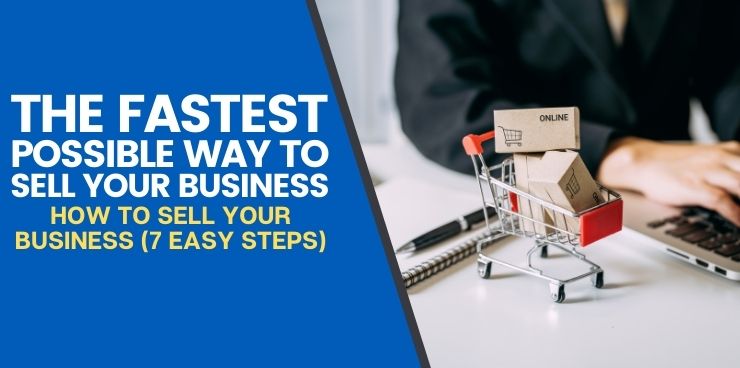What is your competition up to these days?
You have to know. And we do not mean their latest product launch, although that matters too. We mean all the tiny details of what they have been doing, what they have to offer, and all those small parts that you might not be paying attention to.
Why?
Because they know what you have been doing. At least, if they are successful in your industry, they do. And if you are trying to figure out how to sell your business, you need to walk in their shoes for a little bit beforehand.
But that’s not all.
“How do I sell my business? What are the key things I have to know when I buy and sell? Who do I need to talk to? Do I need a broker to sell my business?”
Well, there is a lot to take into account. And most of it comes down to hefty planning. But we have all of it laid out here for you today, in your own personal selling-a-business checklist.
How Do You Figure Out the Worth of a Business?
It can be next to impossible to figure out your company’s worth when you are learning how to sell your business. At least, it might feel that way.
The easiest answer to this question is to answer this one:
How much is someone willing to pay for it?
But we know it goes deeper than that.
There are three methods you can use to determine how much your business is worth. First, you can look at your assets. How much money would it take to buy similar equipment that would replace your current assets? You want the new ones to be in similar shape as your current assets. This might not work if your earnings go beyond the value of your assets, though.
Second, there is a market approach. Which of your competitors in your industry have assets close to yours? You can dive into both their tangible and intangible assets. Think of your business’s value in a similar way to theirs. But if you have a distinct and foundational difference in your business operations, stay away from this approach.
Third and last of all, you have an income-based approach. Here, you want to pull up your pre-and after-tax business earnings. You can also look at your gross sales or similar metrics for this approach. Follow by adding up your tangible asset values. Tack on a multiple for addressing your potential growth later on. And there you have it.
Later still, we will talk about how much a business broker can help to sell a business.
 What Paperwork Do You Need to Sell a Business?
What Paperwork Do You Need to Sell a Business?
As we mentioned before, how to sell your business depends a lot on how well you organize everything beforehand and during the process.
So you need to make sure you have the following paperwork in order as you get started:
- Accounting documents (You want to get these together quite far in advance of selling your business)
- Real estate information (Or, leasing information)
- Service contracts
- Rental agreements for any equipment
- Customer contact information
- Corporate documents
- Government licensure
- Supplier contact list
- Company vehicle documentation and registration
- Insurance policy copies
- Employee benefit information
- Union information
- Intellectual property paperwork
- And anything else you believe will benefit you when you sell your business
When Should You Sell a Business?
How to sell your business, and how to sell a business quickly, depends on your timing— big-time.
To get the results you want, there actually is not much you can do fast. This is because you have to plan for this big change way ahead of time. It cannot be a decision you make in haste.
You want to start your prep work at least one to two years before you make the sale, or solid strides to make the sale.
Then, you will have a much better chance of getting all the right paperwork together. You can also make serious efforts to build your customer core for higher profits before you sell. And if you care about your customers and their happiness, you want to ease the burden of your buyer having to pick up too much slack when they take over.
Otherwise, you could make things sticky for your stakeholders. Plus, if you want to pick back up with another business idea later, your previous customers are sure to appreciate your efforts in the past. Who knows? They might come to your new company in the future to continue doing business with you.
7 Easy Steps in Selling Your Business Fast
We know that the question of how to sell your business is not always cut-and-dry. There is not some magical website to sell your business on a spontaneous flight of fancy. Nor are there magic eight balls to shake when you want a buyer, fast.
But with some preparation, a lot of organization, and a little help, we can get you there.
Let’s talk about the seven easiest steps to sell your business when you need it the most.
Consider a Third-Party Appraisal
It’s easy to get caught up in the throes of your professional life. It’s just as easy to let those responsibilities blind your appraisal of your business.
But when you want to understand how to sell your business, understand too that sometimes you need outside expertise.
Third-party valuations are the real way to show you what your business is worth. These companies often have a one-time and upfront fee for you to pay. Then, they can check out your business and that of your competitors. A professional comes in and analyzes things like:
- Inventory
- Assets
- Sales
- Receivables
- Current amount of debt
- External threats
- Opportunities
- Cash flow
- Perceived risk
Be Transparent With Your Business Financials
Say that you are buying a new house. (Well, new to you.)
When you are under contract, you have to go through inspections on the house you want to buy. What do you think? Should your inspector ignore any glaring foundational issues and let you figure it out on your own, later on down the line?
We’re going to take a guess: No.
You want transparency when you make a big investment or important decision. And your potential buyers want, and expect, the same.
As a collective nation, we have all become more careful when making huge purchases. Prospective buyers and investors will take their time on a sale when something seems fishy to them. If it turns out to be fishy, they will not buy at all.
So be transparent. It goes a long way.
Prepare Financial Statements and Tax Returns in Advance
As you make sure you show transparency in your financials, you want to start compiling your paperwork.
Think of earlier, when you looked over the list of paperwork to prepare before you sell. Ideally, you should get everything together far in advance. But pay special attention to those financial statements and tax returns ahead of time.
A good rule to follow here is to present those two categories of documents that date from three years back, at a minimum.
Sell When Your Sales Are Up
Potential buyers do not want to take on a business that does not make money. When their goal is to make money, they do not want to end up responsible for an organization that sucks their bank account dry in the end.
If you are going through a period of stagnation or one where sales are down, it is not prime time to sell. Give your business a facelift before you do, and make sure your sales are up.
 Hire a Reputable Business Broker
Hire a Reputable Business Broker
Sometimes, you need a business broker. It is impossible to do everything by yourself, and selling your business is often one of those times where you need some additional help.
Reputable brokers will earn about a 5 to 10 percent commission on what you sell your business for. They will be the ones to carry out your business valuation. Then, they use their network to find you the perfect buyer.
Always Pre-Qualify Your Buyers
Call to mind the house-buying example again. You have to apply for pre-approval or pre-qualification before you get a mortgage to buy.
The same goes here. You need a buyer who has the financial means to follow through, not the first guy to walk through the door and express vague interest. That might turn out to be false hope. Not to mention, saying yes to a through-the-roof offer that falls through can mean missing out on quality, qualified buyers in the meanwhile.
Plan Your Exit Strategy
Maybe you are wondering how to sell your business for the future. As in, far, far into the future. This is a great opportunity to plan ahead, especially when it comes to planning your exit strategy.
Planning for this at the moment means you might have to give up your selling power. If you start planning in advance, you can keep your competitive edge within your market.
Conclusion
You might be looking for answers when you wonder how to sell your business. Why do you have to do this in the first place? Do you need changes that you cannot bring to fruition in your business?
It could be because you are trying changes and evolutions to your selling systems and strategies. But you may not have realized that what you need is a revolution, not another evolution.
Luckily, you have Selling Revolution to help.
We are here for you when you need to increase the volume of your quality leads. We have the answers when you need to improve your sales training. Whatever the solution you need for your selling system, Selling Revolution is ready to bring it to you.
Why wait?


 What Paperwork Do You Need to Sell a Business?
What Paperwork Do You Need to Sell a Business?
 Hire a Reputable Business Broker
Hire a Reputable Business Broker